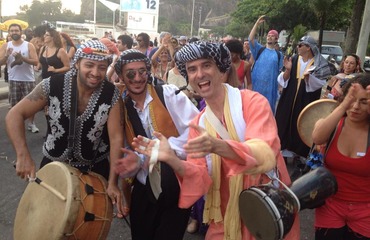São Paulo – An amalgamation of Brazilian and Arab rhythms will take charge of the streets of Leblon, a neighborhood in southern Rio de Janeiro, on Carnival Monday (27). For the fourth year in a row, the parade band “Alibabou e suas 40 Odaliscas” has been a staple of the city’s street, which is the biggest in Brazil.
The parade will move to the sound of an exclusive marchinha-type song written in Arabic. The author, Filipe de Moraes Paiva, said in an interview with ANBA that the inspiration came from a trip to Egypt: “Since I had a habit of writing sambas in other languages, someone suggested that I write one in Arabic. I learned a few words during that trip and so I wrote the lyrics,” he says.
Although it is a play on words, the samba “Salam” does have a meaning, and it even got the approval of a Libyan tourist: “He was walking down the street, he saw the parade and came up to us. I asked if he was able to understand what we were singing in Arabic and he said yes. To prove his point, he translated the lyrics into Portuguese, which goes to show that our pronunciation was great,” says Paiva.
In addition to the exclusive tune, the paraders sing Brazilian marchinhas like ‘Alalaô’ and play Arab rhythm instrumentals. Its final destination after cutting through Leblon is the aptly named Jardim de Alah (Garden of Allah), a park at the boundary with the Ipanema neighborhood. Brazilian percussion instruments like pandeiro, bass drum and tamborim are played alongside Arab ones such as darbuka, tabel, snujs and daff.
Paiva explains that all of the paraders are Brazilian-born. The Arab connection came by way of his wife, who teaches bellydancing and takes trips to Egypt almost every year. The first time the parade was out, in 2000, its female dancers were clad as odalisks. A 14-year hiatus followed. In 2014, the group danced to the tune of a samba written by Paiva, himself a Physics teacher.
The paraders and the female dancers in the roughly 40-strong all dress in character. “It’s a small group; we have no sound system or anything. It’s just us, singing at the top of our lungs, so we can’t have that much people,” explains Paiva.
He believes Brazilian samba and Arab rhythms have much in common. “The baião [a rhythm from northeast Brazil that was made popular by singer Luiz Gonzaga], for instance, is very similar to Arab music,” he ponders. A music lover since his childhood, Paiva plays several instruments, including the clarinet, the xylophone and the drums. During the parade, he usually plays the darbuka.
The group will have its final rehearsal before the Carnival parade on Sunday afternoon (19) at Pontal do Leblon. For 2018, the teacher announces that a brand new samba in Arabic is in the works.
Quick facts
Alibabou e suas 40 odaliscas
February 27, beginning at 4 pm
Leaving from Pontal do Leblon towards Jardim de Alah, moving along the shadow of the Morro Dois Irmãos hill – Rio de Janeiro/RJ
Find out more: https://www.facebook.com/groups/alibabou (in Portuguese)
*Translated by Gabriel Pomerancblum




